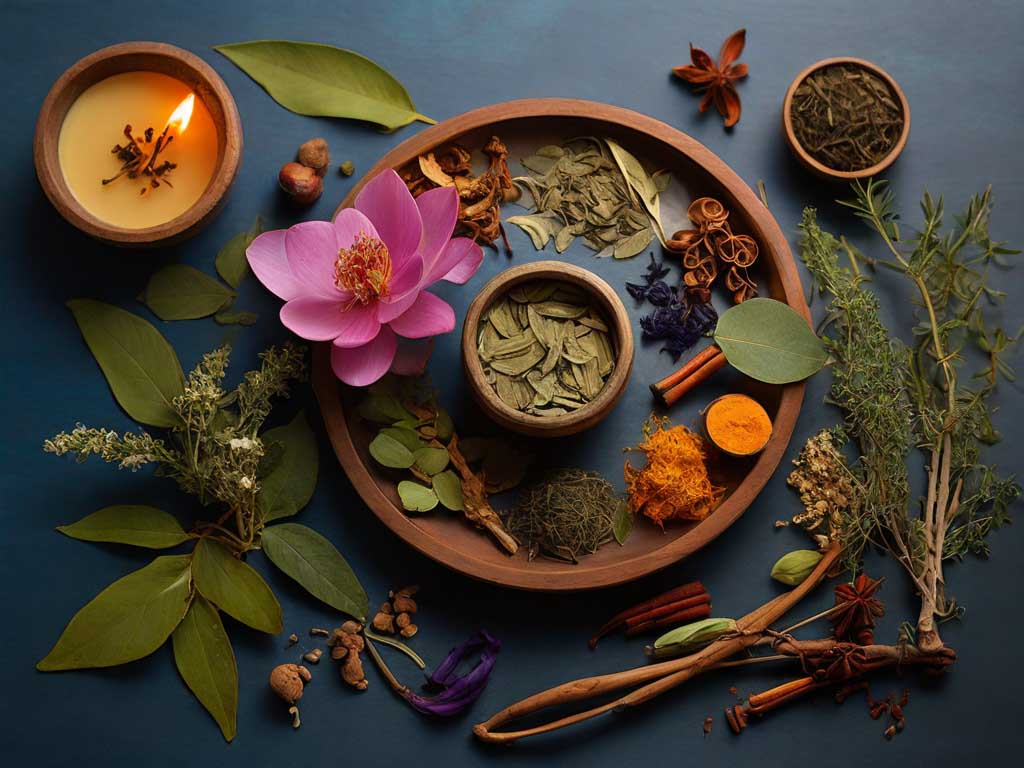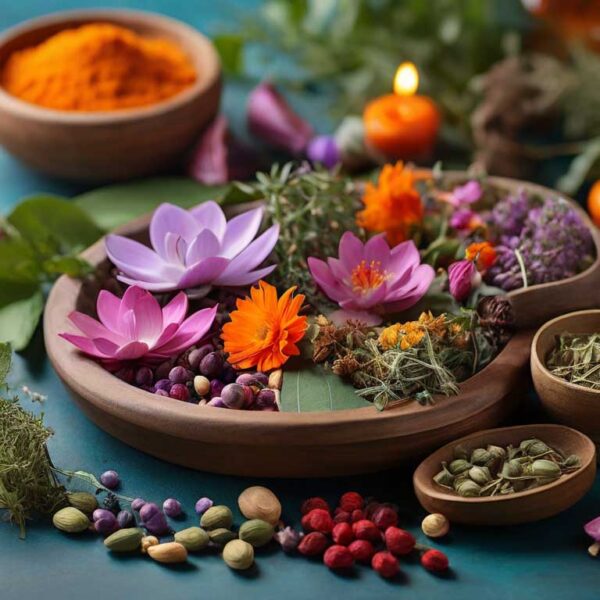
“Harmony Unveiled: An In-Depth Exploration of 15 Ayurvedic Herbal Remedies and Traditional Indian Medicine”
Prelude:
Ayurveda, the ancient system of medicine that originated in India over 5,000 years ago, holds a profound understanding of the interconnectedness between the mind, body, and spirit. At the core of Ayurveda lies the principle of achieving balance and harmony within the body to promote overall well-being. One of the fundamental aspects of Ayurvedic healing is the extensive use of herbal remedies, derived from nature’s bounty. In this comprehensive exploration, we delve into the rich tapestry of Ayurvedic herbal remedies, understanding their historical roots, core principles, and the holistic approach they bring to health and healing.
he historical roots of Ayurveda trace back to ancient India, where it emerged as a comprehensive system of healthcare and well-being. The term “Ayurveda” is derived from Sanskrit, with “Ayur” meaning life and “Veda” signifying science or knowledge. Thus, Ayurveda translates to “the science of life,” emphasizing its holistic approach to understanding and promoting well-being.
The earliest references to Ayurvedic principles can be found in the Vedas, ancient Indian scriptures that form the foundation of Hindu philosophy and knowledge. Among these scriptures, the Rigveda stands out as one of the oldest texts in the world, dating back over 3,000 years. Within the Rigveda, there are hymns and verses that allude to the fundamental principles of Ayurveda, revealing the deep connection between this ancient science and the cultural and spiritual fabric of early Indian society.
The Rigveda contains insights into the natural elements, the human body, and the concept of health and disease. It discusses the interconnectedness of the individual with the environment, emphasizing the need for balance and harmony to achieve optimal health. These references indicate that the principles of Ayurveda were not invented but rather discovered and documented based on observations of nature and the human experience.
Over the centuries, Ayurveda evolved, adapting to changing cultural, social, and environmental contexts. It absorbed influences from various cultures and civilizations that interacted with India, enriching its knowledge base while preserving its core philosophy. The holistic understanding of health and the emphasis on individualized approaches to well-being remained central to Ayurvedic teachings.
As Ayurveda developed, it found expression in additional ancient texts, including the Atharvaveda, which specifically dealt with medical knowledge and healing practices. The Charaka Samhita and Sushruta Samhita, two classical Ayurvedic texts, were composed around 600 BCE and became foundational works in the system. These texts provided detailed insights into anatomy, physiology, surgery, and the use of herbs for therapeutic purposes.
Ayurveda’s evolution was not limited to India alone. As trade routes expanded and cultural exchanges took place, Ayurvedic knowledge spread to other parts of the world, influencing traditional medicine systems in regions such as Southeast Asia and the Middle East.
Despite the passage of millennia, Ayurveda’s enduring principles highlight its timeless relevance. Its holistic approach, rooted in the understanding of the interplay between the individual and the universe, resonates with contemporary perspectives on health and well-being. Ayurveda’s adaptability and ability to integrate diverse influences underscore its resilience as a comprehensive system of medicine and lifestyle management.
In summary, the historical roots of Ayurveda can be traced back to the ancient Indian scriptures, particularly the Rigveda, where foundational principles were articulated. Through centuries of evolution and cultural exchange, Ayurveda has retained its core philosophy while adapting to the dynamic tapestry of human civilization, making it a timeless and invaluable system for promoting Ayurvedic Herbal Remedies for holistic health and vitality.
Central Principles of Ayurveda:
Ayurveda revolves around the concept of doshas – three fundamental energies that govern various physiological and psychological functions within the body. These doshas, named Vata, Pitta, and Kapha, represent combinations of the five elements: ether, air, fire, water, and earth. The unique constitution of an individual, known as Prakriti, is determined by the predominance of these doshas.
Herbal Remedies in Ayurveda:
Herbal remedies are integral to Ayurvedic healing, with a vast array of plants and herbs harnessed for their therapeutic properties. These Ayurvedic Herbal Remedies aim to restore balance within the doshas, addressing the root cause of ailments rather than merely alleviating symptoms. Each herb is believed to possess a specific combination of tastes, energies, and post-digestive effects, influencing the doshas in unique ways.
- Triphala: The Three-Fruit Wonder
Triphala, a blend of three fruits – amla, haritaki, and bibhitaki, is a cornerstone of Ayurvedic herbal remedies. Known for its gentle yet effective detoxifying properties, Triphala cleanses the digestive system, promoting optimal nutrient absorption.
- Ashwagandha: The Stress Buster
Ashwagandha, an adaptogenic herb, is renowned for its ability to combat stress and promote resilience. It helps regulate the body’s stress response, supporting both mental and physical well-being.
- Turmeric: The Golden Healer
Turmeric, with its active compound curcumin, is celebrated for its potent anti-inflammatory and antioxidant properties. It aids in managing various conditions, from joint pain to skin disorders.
- Tulsi: The Sacred Basil
Tulsi, or holy basil, is revered for its adaptogenic and immune-boosting qualities. It helps the body adapt to stress while enhancing overall vitality.
- Brahmi: The Memory Enhancer
- Brahmi is renowned for its cognitive-enhancing properties. It supports mental clarity, memory, and overall brain function, making it a valuable herb for students and those looking to boost cognitive performance.
- Trikatu: The Digestive Fire Igniter
- Trikatu, a blend of ginger, black pepper, and long pepper, is known for stimulating digestive fire. It aids in digestion, enhances metabolism, and helps alleviate digestive discomfort.
- Neem: The Skin Saver
- Neem is a powerful herb with antibacterial and antifungal properties. It is often used in skincare to address issues like acne, eczema, and psoriasis, promoting healthy and clear skin.
- Guduchi: The Immune Booster
- Guduchi, also known as Giloy, is celebrated for its immune-boosting properties. It helps the body fight infections and contributes to overall immune system health.
- Aloe Vera: The Soothing Succulent
- Aloe Vera, although commonly associated with skincare, is an Ayurvedic herb known for its cooling and soothing properties. It aids in digestive health and supports the skin’s natural healing processes.
- Shatavari: The Feminine Essence
- Shatavari is a revered herb for women’s health, supporting hormonal balance and reproductive well-being. It is particularly beneficial for women during various life stages.
- Amalaki: The Vitamin C Powerhouse
- Amalaki, or Indian gooseberry, is rich in Vitamin C and antioxidants. It supports the immune system, enhances skin health, and provides nourishment to the body.
- Licorice (Yashtimadhu): The Harmonizer
- Licorice is known for its harmonizing effects on various bodily systems. It is used to soothe the respiratory and digestive systems and is often included in formulations to balance herbal combinations.
- Guggul: The Cholesterol Regulator
- Guggul is derived from the resin of the Commiphora wightii tree and is known for its cholesterol-lowering properties. It supports cardiovascular health and helps maintain healthy lipid levels.
- Arjuna: The Heart Tonic
- Arjuna bark is traditionally used as a heart tonic in Ayurveda. It supports cardiovascular function, helps maintain healthy blood pressure, and promotes overall heart health.
- Bhringraj: The Hair Rejuvenator
- Bhringraj is a potent herb for hair health. It nourishes the scalp, promotes hair growth, and helps prevent hair loss, making it a popular choice in Ayurvedic hair care.
These Ayurvedic herbs, with their diverse therapeutic properties, showcase the breadth of nature’s healing potential. Integrating these herbs into daily life aligns with the Ayurvedic philosophy of maintaining balance and preventing imbalances that can lead to ailments.
Holistic Approach to Health:
Ayurvedic herbal remedies embrace a holistic approach to health, considering not only the physical symptoms but also the mental and spiritual aspects of an individual. Lifestyle choices, dietary habits, and daily routines are all integral components of Ayurvedic healing. The emphasis on preventive care and the concept of “Rasayana” – rejuvenation therapies, contribute to the overall longevity and vitality of an individual.
Ayurveda and Modern Science:
In recent years, modern science has begun to recognize and validate many of the principles underlying Ayurvedic herbal remedies. Scientific studies have explored the anti-inflammatory, antioxidant, and antimicrobial properties of various Ayurvedic herbs, shedding light on their potential in treating a range of conditions.
Wrap-Up:
In conclusion, this exploration of Ayurvedic herbal remedies unveils a treasure trove of ancient wisdom that continues to offer profound insights into holistic well-being. From the historical roots of Ayurveda to the therapeutic wonders of herbs like Triphala, Ashwagandha, Turmeric, and Tulsi, the synergy between nature and healing is evident. As Ayurveda gains recognition in modern science, its time-tested principles stand as a beacon for those seeking harmony and balance in their journey to health. Embrace the wisdom of Ayurveda, and let nature’s remedies guide you on the path to optimal well-being.



